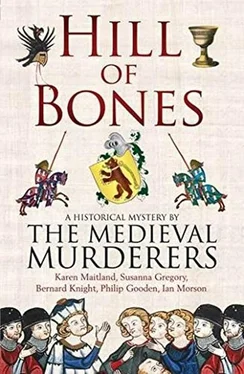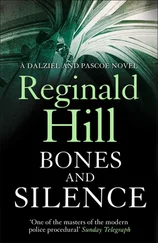Hubert shrugged. ‘It must be God’s will, Eldred. The Almighty will extract vengeance one day, though it may be a long time before Maurice is found.’
The squinting sacrist was right, but he had no idea how long it would be before the cellarer’s clerk was discovered.
Brean, Somerset, Good Friday, 1453
Old Joan found the first corpse just before dawn or, to be more accurate, she fell over it and banged her knee hard on a sharp rock jutting out of the sand. She cursed loudly as she massaged the bruise, but she could not afford to indulge her pain for long. Distant voices, carried towards her on the salt breeze, compelled her to focus her attention on the man lying on the beach.
There was no question that he was dead. His bulging eyes were open and glassy, staring sightless up at the ghost of the moon. Strands of wet grey hair clung to his forehead and a crust of salt was already beginning to frost the stubble on his grizzled chin. Wincing, Joan crouched down on the damp sand. She slid her hand over the stranger’s fish-cold face and closed his eyes.
She crossed herself, muttering a swift prayer to St Nicholas, patron saint of sailors, and Our Lady of the Sea, for them to have mercy on this stranger’s soul. Then, in less time than it takes to say a ‘ Paternoster ’, Joan ran her callused fingers over the body of the corpse and stripped it of what few items of value she could find – an enamel amulet in the form of a blue eye, a small leather bag containing a couple of silver coins and a belt with a broad brass buckle. Painfully, the old woman struggled to her feet and moved on, searching for another corpse or, if she was lucky, a barrel or chest she could prise open.
She knew there would be other bodies. Last night there had been a storm. Seeing the purple clouds massing, all the local boatmen had beached their little fishing boats high up on the shore long before nightfall. But when the villagers left the church of St Bridget, after the vigil for the Eve of Good Friday, they spotted the lanterns of a ship rising and falling in the darkness far out in the bay. They stood silently huddled against the wind, watching the ship being driven relentlessly towards the cliffs of Brean Down at the far end of the sands. They saw the wind rip her sails into rags and her back break on the rocks. Then, as one, the villagers crossed themselves as the foaming waves surged over her decks, dragging men and masts alike down into the thundering depths.
The sailors and fishermen among the villagers – and there were many – shook their heads. The storm was a bad one, to be sure, but it was not so violent as to drive a well-manned ship onto the rocks, not if the sails had been furled in time and the captain had been doing his job. They muttered darkly that the ship was on a doomed voyage, cursed from the outset. Maybe an enemy had hidden a hare’s foot on board, or else a sailor’s daughter had neglected to crush the shell of her boiled egg, but whatever the cause, once the ship was on the rocks there was no saving her, nor any man who sailed on her.
The villagers had gone to their beds then, knowing that neither kegs nor corpses would drift ashore until the tide turned. The priest had remained a while on his knees before the altar, praying for the souls of the men drowning out there, but at the same time he could not help adding a plea to the Blessed Virgin for the ship to be carrying a valuable cargo that might wash ashore, for the church was badly in need of repair.
And so it was that as the rind of the sun crept above the horizon, the shoreline was already crawling with villagers, who, like Joan, were searching for anything of value they could salvage from the stricken ship and drowned men. They worked in haste, not only to beat their neighbours to the treasures that might be strewn along the sand, but also because they knew only too well the penalties of getting caught.
Anything washed up on the shoreline belonged to King Henry, a milksop of a king, they all agreed, who had once vomited so violently at the sight of a traitor’s quartered body, that he gave orders that no such mutilation was to occur again. But a feeble king cannot control his own officers, and the local sheriff interpreted the law exactly as he pleased, inflicting cruel punishment on anyone who deprived him of spoils that would otherwise mysteriously disappear into his own coffers. The villagers had learned to spirit away anything they could salvage before the sheriff’s men arrived to search their homes – that was the way of it and had been for generations.
Old Joan was losing ground. Years of beachcombing had lent her fingers skill in searching, but in payment those same years had taken swiftness from her feet and strength from her back. She couldn’t carry off the great barrels like the men, nor run like the girls to be first at a corpse. So, like the gulls, she sidled around the other villagers, her eyes searching for any unfamiliar shape against the distant rocks she knew so well, in the hope of spotting a body lying apart from the others.
Joan was in desperate need of any scrap she could find. First her poor daughter had died in childbirth. Then, within weeks, her grieving son-in-law had been crushed by an overturned wagon, and Joan had suddenly found herself the sole provider for her three grandchildren. And if that was not trouble enough to heap on any old woman’s head, the eldest grandchild, Margaret, had of late been struck down with pains in the guts and frequent vomiting, which no amount of purges or physic could cure. If ever a woman deserved a crumb of good luck in her life, poor old Joan did.
Her attention was caught by a pair of gulls repeatedly diving at something on the water’s edge. She raised her hand to shield her eyes and squinted against the sun dazzling off the sea. There was something drifting out there in the shallows, though it might be nothing more than a splintered plank from the ship. She edged cautiously along the shore, trying to look as if she was still searching the ground at her feet so as not to draw attention to the distant shape. When she was close enough not to be overtaken, even by the young men, she hurried over.
The top of a ship’s mast was floating in the shallow water, rising and falling in the gentle wavelets. The wood had broken off in such a way as to form the shape of a cross. But it was not the shape of the wood that made Joan gasp and stare. The body of a man was stretched out on the mast. The corpse’s feet were bound fast to the down spar with a stout rope. His arms had been stretched out on either side of him, and his wrists were bound equally firmly to the cross spar.
As the old woman stared, a larger wave lifted the wooden mast, pushing it higher up the beach, as if the sea was offering her a gift. She hitched her skirts into her belt and waded into the water. Seizing the top of the spar, where the man’s head lolled, she tried to pull it higher up the sand. It was so heavy that at first she could only drag it an inch or two, but using the force of the next wave to lift it, she finally managed to beach it where it would not easily be pulled back into the sea.
Joan stared down. The eyes of all the other corpses had been opened wide as if desperate for a last glimpse of this world before they entered purgatory. But not this one; his eyes were closed and there was an expression that you might almost have called triumph about those slightly parted lips. He looked to be in his thirties. His hair and beard were long, thick and, beneath the salt shimmer, dark as a mussel shell. With a straight, thin nose and sharp cheekbones, he would have been a striking figure when he lived – not handsome exactly, but with the kind of face that would command a second look.
Her gaze travelled to his hands, bound tightly against the dark wood. They were as soft and elegant as a highborn lady’s. This man was no sailor, that much was plain. She felt her pulse quicken. He must have been a passenger on the ill-fated voyage, a gentleman perhaps, even a noble. What might such a man have concealed beneath his sodden clothes – ingots of silver or gold, a jewel?
Читать дальше












